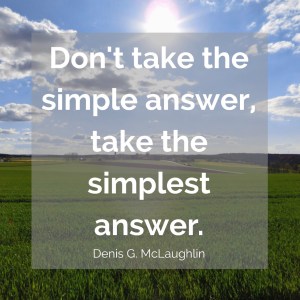 We all have a moment, or moments, when something we knew only by rote memorization becomes something more. We move from repeating what the answer is, to understanding why the answer is. This is when the light bulb is turned on and what was once hidden becomes visible. When that happens, it expands your ability to use your understanding of why, to make the what happen.
We all have a moment, or moments, when something we knew only by rote memorization becomes something more. We move from repeating what the answer is, to understanding why the answer is. This is when the light bulb is turned on and what was once hidden becomes visible. When that happens, it expands your ability to use your understanding of why, to make the what happen.
Quantum Mechanics in Chemistry
The eminent scientist Linus Pauling earned his Ph.D. in 1925 and the following year he accepted a fellowship to study under several leading physicists who were pioneering Quantum Mechanics – Neils Bohr, Erwin Schrodinger, and Arnold Sommerfeld. Here, according to Sam Kean in his book The Disappearing Spoon, “Pauling figured out how quantum mechanics governs the chemical bonds between atoms.” It was for this that one of Pauling’s colleagues noted that, “Chemistry could now be understood rather than being memorized.”
From this point forward, the ability to use the chemical properties improved dramatically. Pauling himself worked on projects that produced synthetic antibodies and substitutes for blood plasma and many others on his way to receiving two Nobel prizes.
It wasn’t knowing only that chemicals reacted in a certain way, it was using Quantum Mechanics to explain why they reacted this way at the molecular level that allowed this to happen.
Human Flight
In 1899, Wilbur Wright wrote a letter to the Smithsonian Institute. He explained how he had studied the work of early aeronautical scientists and asked for all papers that the Smithsonian had published on human flight, “I wish to avail myself of all that is already known…” Wilbur and his brother Orville studied all the scientific books that they received, as well as one book titled Empire of the Air, by Louis Pierre Moullard which discussed the possibility of achieving human flight by studying the birds in flight. The Wright Brothers observed the flight of birds looking for information on how they accomplished this feat. “Learning the secret of flight from a bird, was a good deal like learning the secret of magic from a magician.” – Orville Wright
Wilbur then began communicating with and questioning the most well-known aeronautical engineers of the time including Octave Chanute, who gave the brothers the idea to perform their experiments on the coasts of the Carolinas (where their famous Kitty Hawk flight took place). In a letter Wilbur wrote to Chanute, he outlined what he and Orville now understood about flight, “What is chiefly needed is skill rather than machinery.” And in a speech to the Western Society of Engineers, Wilbur shared that, “The bird has learned this art of equilibrium, and learned it so thoroughly that its skill is not apparent to our sight. We only learn to appreciate it when we try to imitate it.”
We all know the rest of the story here. The Wright Brothers did indeed build a plane and learn how to fly that plane which started the aeronautical revolution that let Elon Musk launch the latest Space X rocket last month.
It wasn’t knowing only that birds can, it was discovering why birds fly that allowed this to happen.
Takeaway
The takeaway for us is the knowledge of why things happen is out there for the asking. Don’t settle for learning that something happens in a certain way, discover why it happens in a certain way and you will achieve great things – When it all becomes clear.
“Isn’t it astonishing that all these secrets have been preserved for so many years, just so we could discover them!” – Orville Wright
 Do you have doubts about your abilities? Of course, we all do at some point. What sets apart those who are the most successful is not whether they have doubts, it whether they believe those doubts.
Do you have doubts about your abilities? Of course, we all do at some point. What sets apart those who are the most successful is not whether they have doubts, it whether they believe those doubts. 









